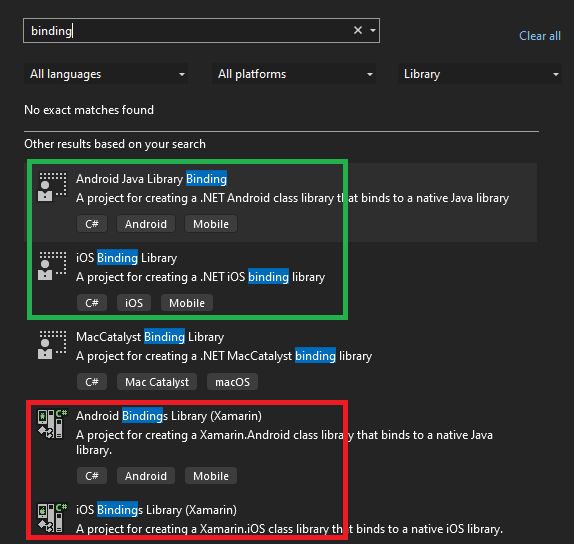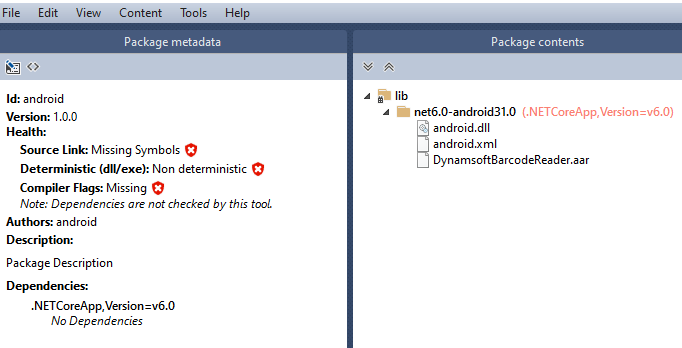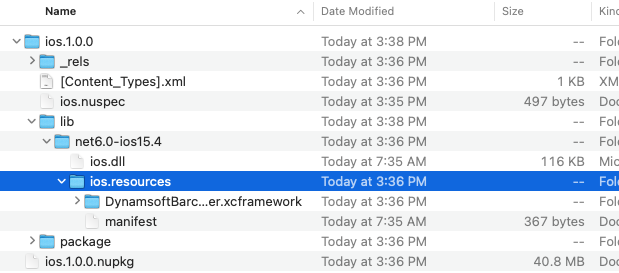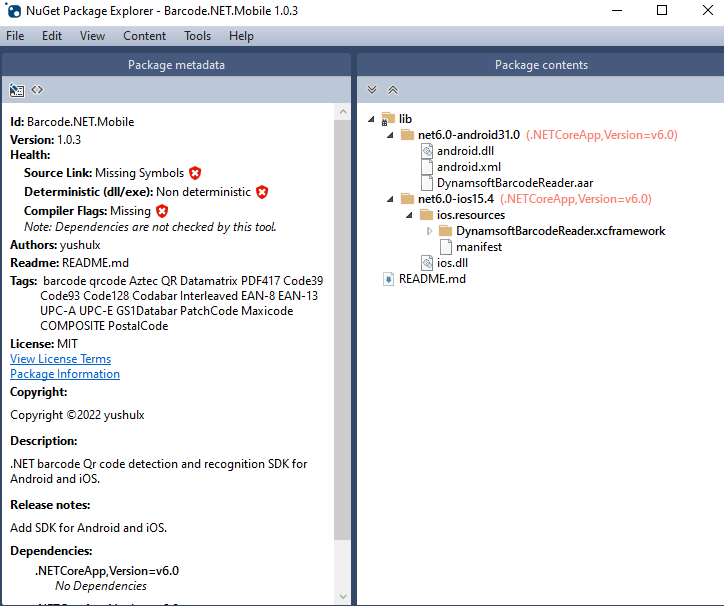How to Build a NuGet Package for .NET MAUI Android and iOS Development
If you try to port Xamarin mobile projects to .NET MAUI, you will find there is no problem with packages built for Xamarin Android, but packages built for Xamarin iOS are incompatible. To tackle this issue, you need to change target framework to .NET 6 and rebuild related packages. Dynamsoft mobile barcode SDK so far only supports Xamarin. This article aims to help you develop mobile barcode QR code scanner apps using .NET MAUI. You will see how to build .NET binding libraries based on Android *.aar and iOS framework from scratch, as well as how to pack Android and iOS SDKs into a single NuGet package.
This article is Part 2 in a 3-Part Series.
Barcode.NET.Mobile for MAUI
https://www.nuget.org/packages/Barcode.NET.Mobile
Prerequisites
Download Dynamsoft Mobile Barcode Scanner SDK
Creating .NET Binding Libraries for Android and iOS
Assume you have installed Visual Studio 2022 Preview on Windows and macOS. Although installing Visual Studio for Mac is not necessary that you can pair to macOS remotely, the output packages of .NET binding libraries for iOS are different between Windows and macOS. We will talk about it in the following paragraphs.
Visual Studio Library Binding Project
When searching for binding in Visual Studio 2022, you will see there are two kinds of library binding projects. One for Xamarin, and the other for .NET 6. To build .NET MAUI-compatible librayr, we select the project templates without (Xamarin).

Binding Android AAR Package for .NET 6
- Drag
DynamsoftBarcodeReader.aarto the Android binding project. -
Select
DynamsoftBarcodeReader.aarand change build action toAndroidLibrary.
- Change the build mode to
Release. - Build the project. Here are the output files:
- android.dll
- android.pdb
- android.xml
- DynamsoftBarcodeReader.aar
-
Right-click on the
csprojfile and selectPackto create the NuGet package.
Binding iOS Framework for .NET 6
- Drag
DynamsoftBarcodeReader.xcframeworkto the iOS binding project. -
Add following code to the csproj file.
<ItemGroup> <NativeReference Include="DynamsoftBarcodeReader.xcframework"> <Kind>Framework</Kind> <Frameworks></Frameworks> </NativeReference> </ItemGroup> - Use Objective Sharpie, a command line tool for macOS, to generate
ApiDefinition.csandStructsAndEnums.csfiles. - Build the project. Here are the output files:
- ios.dll
- ios.pdb
- ios.resources
- DynamsoftBarcodeReader.xcframework
-
Click
Packto create the NuGet package. Now you will see the difference between Windows and macOS. The output package generated by Visual Studio for Windows only containsios.dll. In contrast, the package generate by Visual Studio for macOS containsios.dll,manifestandDynamsoftBarcodeReader.xcframework. Apparently, the package built on Windows cannot work. But don’t worry, according to the structure of the package built on macOS, we can construct a workable package on Windows.
Packing Android and iOS SDKs into a Single NuGet Package
Since we have built Android and iOS packages using Visual Studio, we can publish them respectively to NuGet.org. But, what if you want to build them into a single NuGet package? We can use nuspec file to implement this.
Here are the steps:
-
Create a
nuspecfile.nuget spec - Add the files element and specify a list of files to be included in the package.
<files> <file src="README.md" target="" /> <file src="android/bin/Release/net6.0-android/android.dll" target="lib/net6.0-android31.0/" /> <file src="android/bin/Release/net6.0-android/android.xml" target="lib/net6.0-android31.0/" /> <file src="android/bin/Release/net6.0-android/DynamsoftBarcodeReader.aar" target="lib/net6.0-android31.0/" /> <file src="ios/bin/Release/net6.0-ios/ios.dll" target="lib/net6.0-ios15.4/" /> <file src="ios/manifest" target="lib/net6.0-ios15.4/ios.resources" /> <file src="ios/bin/Release/net6.0-ios/ios.resources/DynamsoftBarcodeReader.xcframework/Info.plist" target="lib/net6.0-ios15.4/ios.resources/DynamsoftBarcodeReader.xcframework" /> <file src="ios/bin/Release/net6.0-ios/ios.resources/DynamsoftBarcodeReader.xcframework/ios-arm64/DynamsoftBarcodeReader.framework/Info.plist" target="lib/net6.0-ios15.4/ios.resources/DynamsoftBarcodeReader.xcframework/ios-arm64/DynamsoftBarcodeReader.framework" /> <file src="ios/bin/Release/net6.0-ios/ios.resources/DynamsoftBarcodeReader.xcframework/ios-arm64/DynamsoftBarcodeReader.framework/DynamsoftBarcodeReader" target="lib/net6.0-ios15.4/ios.resources/DynamsoftBarcodeReader.xcframework/ios-arm64/DynamsoftBarcodeReader.framework" /> <file src="ios/bin/Release/net6.0-ios/ios.resources/DynamsoftBarcodeReader.xcframework/ios-arm64/DynamsoftBarcodeReader.framework/Headers/DynamsoftBarcodeReader.h" target="lib/net6.0-ios15.4/ios.resources/DynamsoftBarcodeReader.xcframework/ios-arm64/DynamsoftBarcodeReader.framework/Headers" /> <file src="ios/bin/Release/net6.0-ios/ios.resources/DynamsoftBarcodeReader.xcframework/ios-arm64/DynamsoftBarcodeReader.framework/Headers/DynamsoftBarcodeSDK.h" target="lib/net6.0-ios15.4/ios.resources/DynamsoftBarcodeReader.xcframework/ios-arm64/DynamsoftBarcodeReader.framework/Headers" /> <file src="ios/bin/Release/net6.0-ios/ios.resources/DynamsoftBarcodeReader.xcframework/ios-arm64/DynamsoftBarcodeReader.framework/Modules/module.modulemap" target="lib/net6.0-ios15.4/ios.resources/DynamsoftBarcodeReader.xcframework/ios-arm64/DynamsoftBarcodeReader.framework/Modules" /> <file src="ios/bin/Release/net6.0-ios/ios.resources/DynamsoftBarcodeReader.xcframework/ios-arm64_x86_64-simulator/DynamsoftBarcodeReader.framework/Info.plist" target="lib/net6.0-ios15.4/ios.resources/DynamsoftBarcodeReader.xcframework/ios-arm64_x86_64-simulator/DynamsoftBarcodeReader.framework" /> <file src="ios/bin/Release/net6.0-ios/ios.resources/DynamsoftBarcodeReader.xcframework/ios-arm64_x86_64-simulator/DynamsoftBarcodeReader.framework/DynamsoftBarcodeReader" target="lib/net6.0-ios15.4/ios.resources/DynamsoftBarcodeReader.xcframework/ios-arm64_x86_64-simulator/DynamsoftBarcodeReader.framework" /> <file src="ios/bin/Release/net6.0-ios/ios.resources/DynamsoftBarcodeReader.xcframework/ios-arm64_x86_64-simulator/DynamsoftBarcodeReader.framework/Headers/DynamsoftBarcodeReader.h" target="lib/net6.0-ios15.4/ios.resources/DynamsoftBarcodeReader.xcframework/ios-arm64_x86_64-simulator/DynamsoftBarcodeReader.framework/Headers" /> <file src="ios/bin/Release/net6.0-ios/ios.resources/DynamsoftBarcodeReader.xcframework/ios-arm64_x86_64-simulator/DynamsoftBarcodeReader.framework/Headers/DynamsoftBarcodeSDK.h" target="lib/net6.0-ios15.4/ios.resources/DynamsoftBarcodeReader.xcframework/ios-arm64_x86_64-simulator/DynamsoftBarcodeReader.framework/Headers" /> <file src="ios/bin/Release/net6.0-ios/ios.resources/DynamsoftBarcodeReader.xcframework/ios-arm64_x86_64-simulator/DynamsoftBarcodeReader.framework/Modules/module.modulemap" target="lib/net6.0-ios15.4/ios.resources/DynamsoftBarcodeReader.xcframework/ios-arm64_x86_64-simulator/DynamsoftBarcodeReader.framework/Modules" /> </files>The
manifestfile used for iOS build is auto-generated by the Visual Studio for Mac.<BindingAssembly> <NativeReference Name="DynamsoftBarcodeReader.xcframework"> <ForceLoad></ForceLoad> <Frameworks></Frameworks> <IsCxx></IsCxx> <Kind>Framework</Kind> <LinkerFlags></LinkerFlags> <NeedsGccExceptionHandling></NeedsGccExceptionHandling> <SmartLink></SmartLink> <WeakFrameworks></WeakFrameworks> </NativeReference> </BindingAssembly>In addition, add dependencies for different target frameworks.
<dependencies> <group targetFramework="net6.0-android31.0"> </group> <group targetFramework="net6.0-ios15.4"> <dependency id="System.Runtime.InteropServices.NFloat.Internal" version="6.0.1" exclude="Build,Analyzers" /> </group> </dependencies> -
Build the package:
nuget pack
Now you can install Barcode.NET.Mobile for .NET MAUI mobile development.
Try .NET MAUI Barcode QR Code Scanner
https://github.com/yushulx/dotnet-barcode-qr-code-sdk/tree/main/example/maui


